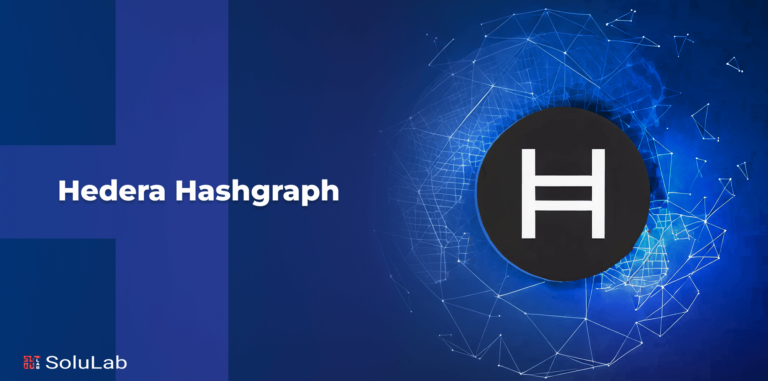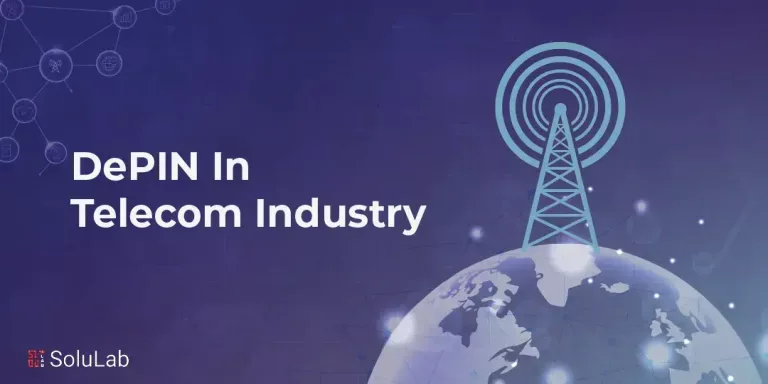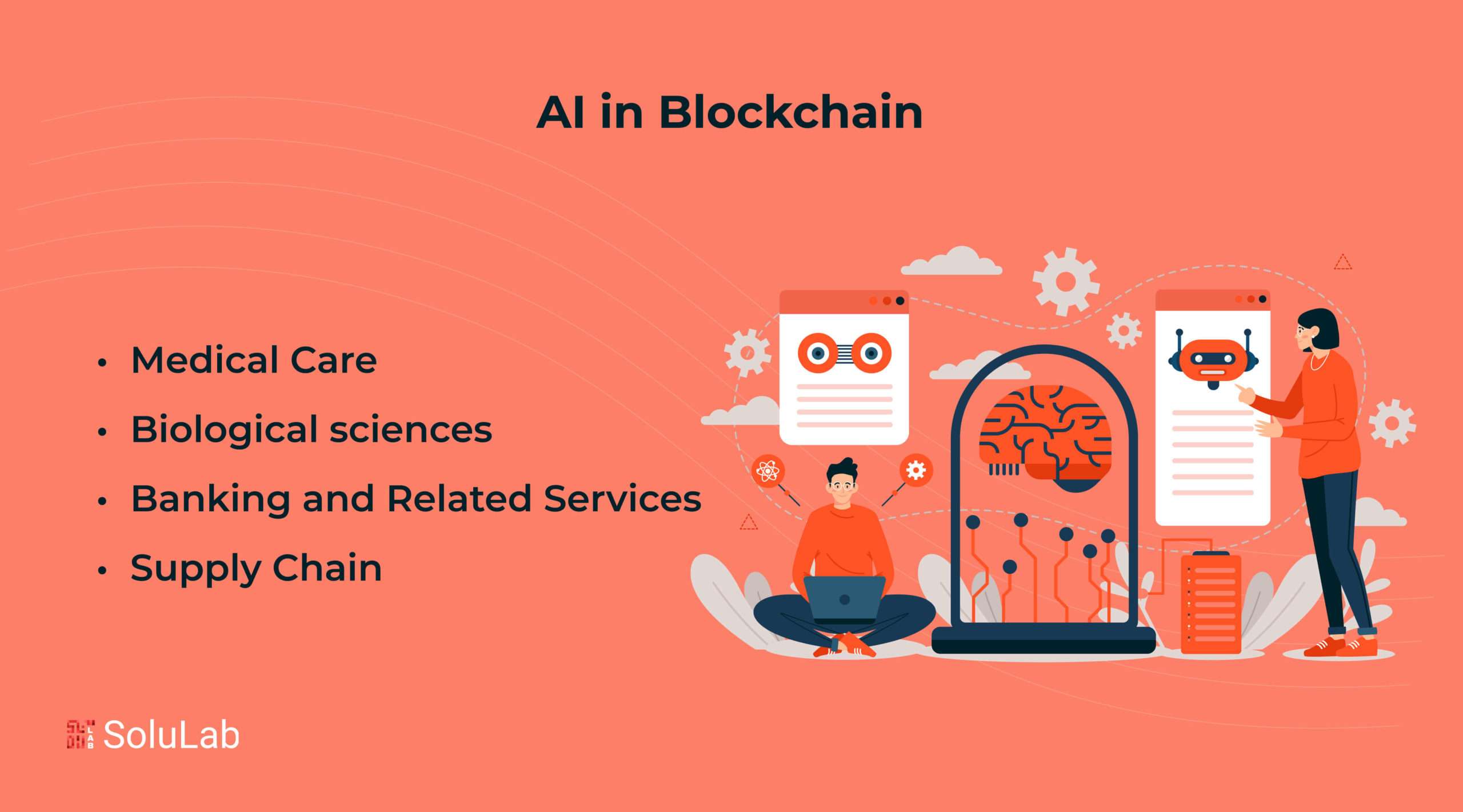
Two modern innovations that are transforming several sectors are blockchain and artificial intelligence. Artificial intelligence, or AI for short, is the replication of human intellect in robots designed to change human behavior and thought processes. Conversely, blockchain is a decentralized digital ledger system that creates transparent and tamper-proof records of transactions across several machines.
When we talk about AI in blockchain, we refer to integrating artificial intelligence algorithms and techniques into blockchain technology. With this connection, an abundance of opportunities arise, allowing blockchain systems to evolve into more intelligent, effective, and self-sufficient entities that can manage intricate tasks.
By utilizing AI in blockchain technology, entities may get increased operational efficiency, security, and transparency. The potential for changing data interaction and business processes in the digital age is enormous, since the marriage of AI and blockchain technology may optimize supply chain logistics and streamline financial transactions.
The Combined Benefits of AI and Blockchain
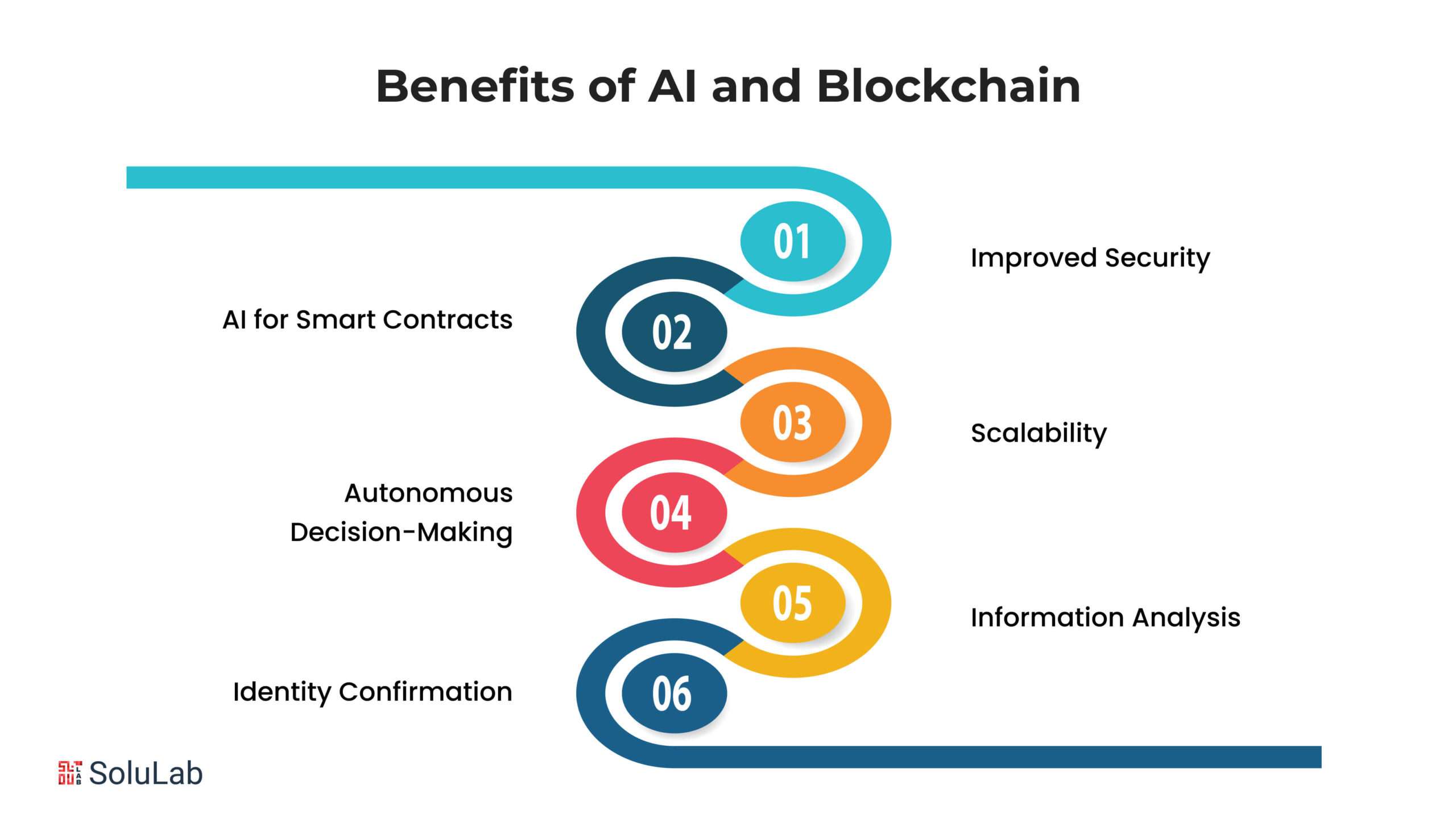
Blockchain and artificial intelligence, two revolutionary technologies, are combining to generate previously unimaginable possibilities in today’s digital world. Let’s examine how artificial intelligence is improving blockchain technology and transforming several industries.
1. Improved Security
By identifying irregularities and stopping fraudulent activity, AI algorithms support blockchain security. Artificial Intelligence (AI) safeguards sensitive data stored on the blockchain and guarantees transaction integrity using sophisticated pattern recognition.
2. AI for Smart Contracts
Smart contracts may become more intelligent and flexible thanks to AI. Smart contracts may automatically carry out activities based on real-time data, increasing efficiency and decreasing conflicts. AI is capable of analyzing complicated situations and predicting results.
3. Information Analysis
Large volumes of blockchain data are sorted through AI algorithms, which then extract insightful information for companies. AI-powered chatbot analytics provide significant strategic advantages in a variety of applications, including supply chain logistics optimization, consumer behavior prediction, and market trend analysis.
4. Scalability
Blockchain scaling issues are solved by AI-driven solutions, which maximize network performance and resource allocation. AI automatically modifies settings to meet growing transaction volumes using machine learning algorithms, guaranteeing seamless operations at scale.
5. Autonomous Decision-Making
Blockchain networks that incorporate AI are better able to support decentralized decision-making processes. Consensus processes enabled by AI allow nodes to independently come to decisions based on pre-established guidelines, fostering equity and openness.
6. Identity Confirmation
AI improves identity verification on blockchain systems, reducing fraud and identity theft threats. AI systems protect the integrity of digital identities and verify user authenticity by examining biometric data and behavioral patterns.
Use Cases for Blockchain and AI
When coupled, blockchain and artificial intelligence (AI) have the potential to completely transform several sectors, including supply chain management, healthcare, life sciences, and financial services.
1. Medical Care
Blockchain-based AI can improve patient care by safely exchanging and storing medical information. Healthcare professionals may more efficiently spot trends, anticipate illnesses, and tailor treatments by using AI to analyze massive volumes of data stored in the blockchain.
2. Biological sciences
Because blockchain technology securely tracks medications throughout their entire lifespan, it may speed up the drug development process. To expedite medication research, enhance clinical trials, and guarantee drug safety and authenticity, artificial intelligence (AI) algorithms can examine data kept on blockchains.
3. Banking and Related Services
Together, blockchain and AI have the potential to revolutionize financial services by improving efficiency, security, and transparency. Blockchain technology guarantees the integrity and immutability of financial data, while artificial intelligence algorithms can identify fraudulent activity in blockchain transactions.
4. Supply Chain
Blockchain-based artificial intelligence (AI) can improve supply chain management by giving real-time insights into the flow of commodities and goods. Businesses may increase supply chain efficiency, decrease counterfeiting, and improve traceability by fusing AI algorithms with blockchain.
Problems and Issues to Consider with AI in Blockchain
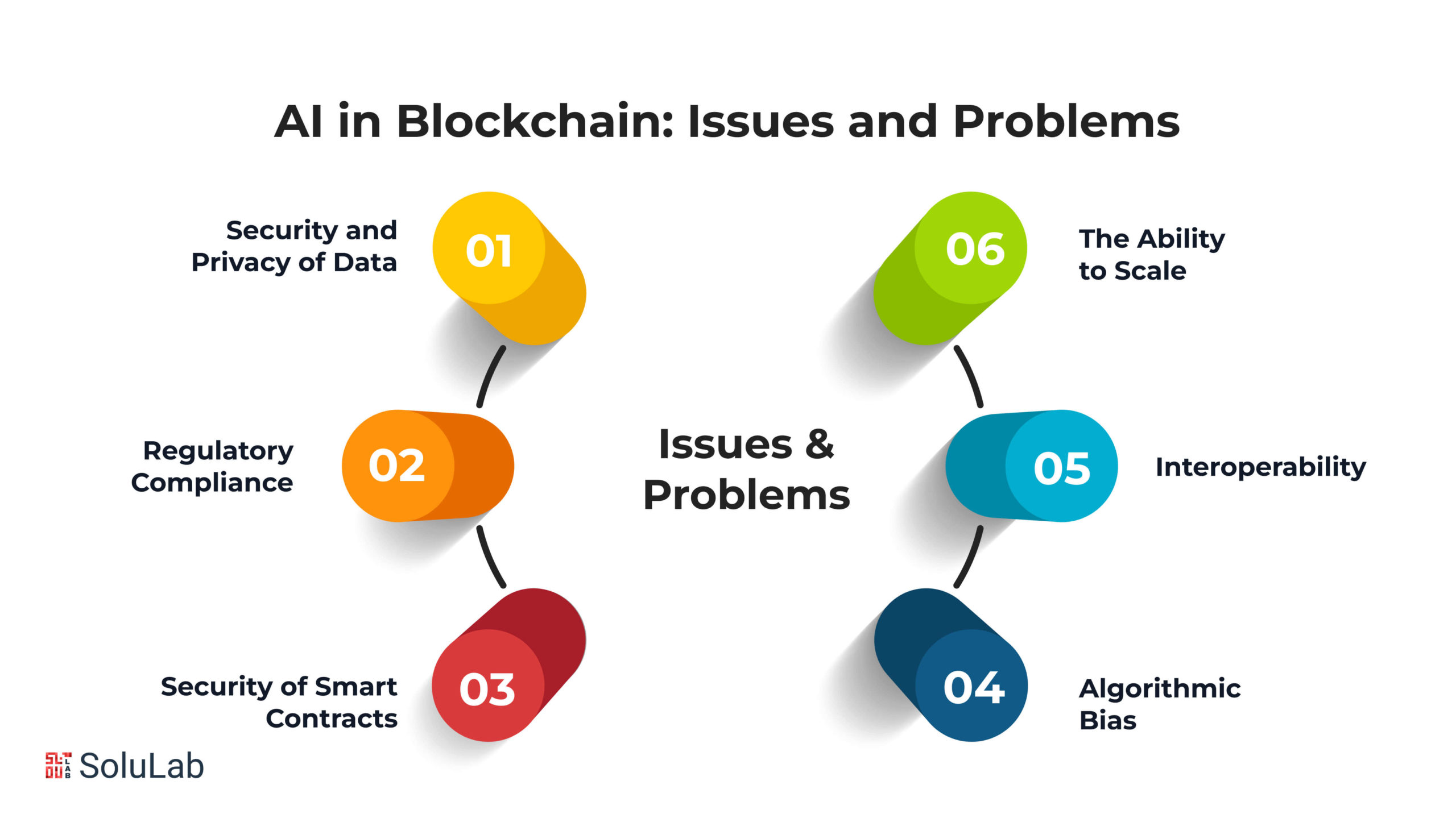
The use of artificial intelligence (AI) in blockchain technology, or “AI in blockchain,” offers both potential and particular difficulties. Let’s examine a few of the most important factors in this creative combination.
1. Security and Privacy of Data
Blockchain requires data privacy to be maintained, and adding AI complicates matters further. For training, AI algorithms require access to data, yet protecting the privacy and security of sensitive data can be difficult. It becomes essential to have strong encryption and access control systems in place.
2. The Ability to Scale
Blockchain and artificial intelligence require a lot of resources. Scalability becomes a major challenge when coupled. Potential bottlenecks may result from the computing needs of AI algorithms and the expanding scale of blockchain networks. It’s crucial to provide effective scaling solutions for seamless integration.
3. Interoperability
To fully realize the promise of AI and blockchain, compatibility between the two platforms must be ensured. Blockchain protocols and various AI models cannot always exchange or easily transmit data. Smoother integration may be achieved by bridging this gap through the standardization of interfaces and protocols.
4. Algorithmic Bias
Biases included in the data used to train AI systems can affect them. These biases can provide unfair or biased results when combined with blockchain, weakening the system’s openness and reliability. To properly address algorithmic biases, careful thought and mitigation techniques are required.
5. Regulatory Compliance
Blockchain technology and artificial intelligence present complicated regulatory issues. It becomes critical to abide by banking rules, data protection laws, and other legal frameworks. It takes careful balance to create AI-driven blockchain solutions that respect legal standards without sacrificing innovation.
6. Security of Smart Contracts
Smart contracts are essential parts of blockchain systems that automate the performance of pre-arranged contracts. Artificial intelligence (AI) adds additional security threats to smart contracts, such as manipulation of transactions led by AI or weaknesses in AI decision-making processes. To reduce these risks, extensive testing and auditing are necessary.
How IP may be Protected by Blockchain in a World Powered by AI?
In our high-tech world, where AI (artificial intelligence) is powering up innovations, safeguarding intellectual property (IP) is crucial. Enter blockchain, the technology that could be a game-changer in protecting IP in this AI-enabled era.
So, what’s the buzz about AI in blockchain? Well, imagine a secure digital ledger that records every transaction or interaction. Now, combine that with AI’s ability to analyze vast amounts of data and make smart decisions. That’s the potential powerhouse of AI and blockchain together.
Here’s how it works: AI algorithms can be integrated into blockchain networks to monitor, detect, and prevent any unauthorized access or tampering with intellectual property. Each piece of IP, be it a patent, copyright, or trade secret, can be encrypted and stored securely on the blockchain. This ensures that only authorized users can access or modify the information.
Moreover, AI algorithms can continuously scan the blockchain for any suspicious activities, such as attempts to copy or misuse IP. If any such activity is detected, the AI can trigger alerts or even automatically initiate countermeasures to protect the IP.
But it doesn’t stop there. AI in blockchain can also streamline the process of verifying ownership and licensing of IP. Smart contracts development, powered by AI, can automatically execute agreements between parties based on predefined conditions. This reduces the need for intermediaries and minimizes the risk of disputes or fraud.
The Future with Artificial Intelligence and Blockchain
Blockchain technology and artificial intelligence (AI) will soon completely change how we do business. Let’s take a look at what this future may bring.
Imagine a future where blockchain technology and artificial intelligence (AI) collaborate to build safer and more intelligent systems. Artificial intelligence in blockchain, or AI on the blockchain, is the combination of decentralized ledger technology and artificial intelligence. Processes might be streamlined, security could be improved, and innovation could be spread across several sectors by this integration.
Financial transactions are one sector that blockchain-based AI has the potential to significantly affect. Transaction security is increased beyond recognition thanks to the real-time detection of fraudulent activity through the use of AI algorithms evaluating data on the blockchain. AI can also improve transaction speeds, which will speed up and improve the efficiency of blockchain-based payments.
However, blockchain and AI have applications outside of finance. For example, AI systems in the healthcare industry may scan through massive volumes of blockchain-stored medical data to find trends and forecast patient diagnoses and treatments with high accuracy. This enhances patient outcomes while guaranteeing the confidentiality and security of private medical data.
Conclusion
The combination of blockchain technology and artificial intelligence (AI) opens up new possibilities in today’s ever-changing digital world. With its network of seasoned professionals, SoluLab provides a means of realizing this potential. SoluLab’s specialist understanding of blockchain and AI enables firms to investigate novel ideas, improve security, and expedite workflows. Businesses may remain ahead of the competition by using their experience to successfully negotiate the challenges of incorporating AI into the blockchain.
Blockchain technology and AI working together provide an abundance of opportunities for several businesses. The combined power of blockchain technology and artificial intelligence (AI) can revolutionize a range of industries, including healthcare, banking, supply chain management, and cybersecurity.
The professionals at SoluLab are ready to provide noticeable outcomes whether they’re working on blockchain application development, improving data privacy, or optimizing smart contracts.
FAQs
1. What is AI in Blockchain?
AI in Blockchain refers to the integration of artificial intelligence (AI) technologies with blockchain technology. It involves using AI algorithms and techniques to enhance various aspects of blockchain networks, such as improving security, scalability, and efficiency.
2. What are the benefits of using AI in Blockchain?
Integrating AI into Blockchain brings several benefits, including improved data security, enhanced transaction speed, increased scalability, automated decision-making processes, and better fraud detection. It also facilitates more efficient resource allocation and reduces operational costs.
3. Can you explain the use of Blockchain in AI?
Blockchain in AI refers to using blockchain technology to store and manage AI-related data securely. It ensures data integrity, transparency, and immutability, which are crucial for training AI models, sharing datasets, and maintaining privacy in AI applications.
4. Is AI and Blockchain integration applicable across different industries?
Yes, AI and Blockchain integration have applications across various industries, including finance, healthcare, supply chain management, logistics, and cybersecurity. It offers innovative solutions for data management, authentication, transparency, and process automation in diverse sectors.
5. How can businesses leverage AI in Blockchain technology?
Businesses can leverage AI in Blockchain technology by adopting AI-driven blockchain platforms, integrating AI algorithms for data analysis and optimization, developing AI-powered smart contracts, and exploring collaborative AI initiatives within blockchain consortia and networks.
6. What are the prospects of AI and Blockchain integration?
The integration of AI and Blockchain is expected to continue evolving, leading to the emergence of innovative applications and solutions across various domains. As both technologies mature and intersect, they have the potential to revolutionize industries, drive efficiency, and create new opportunities for businesses and individuals alike.




